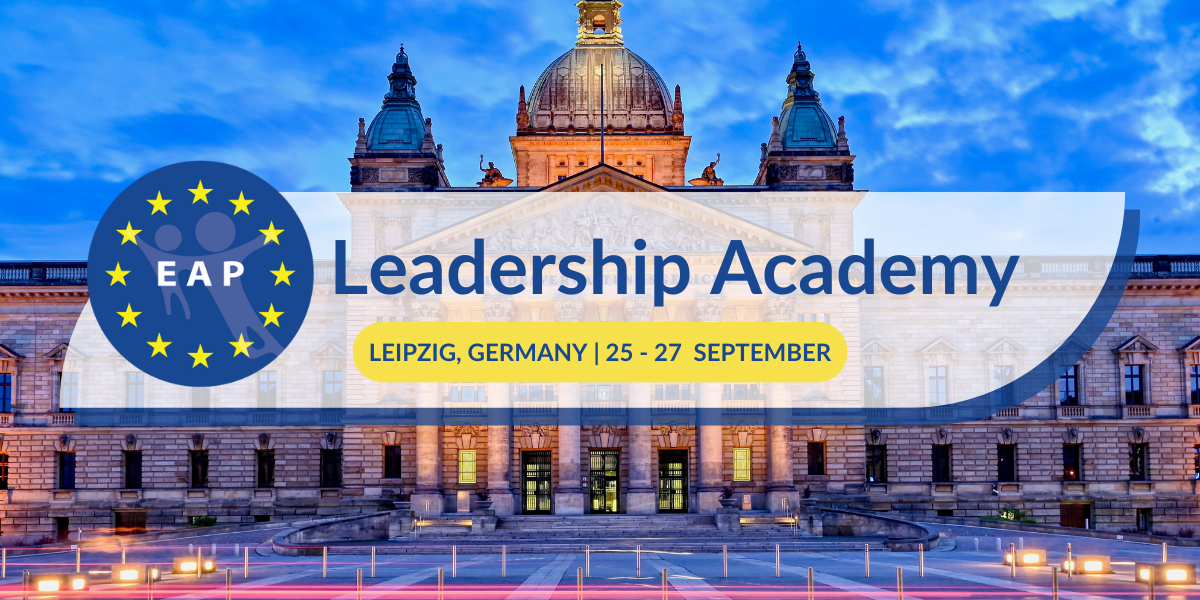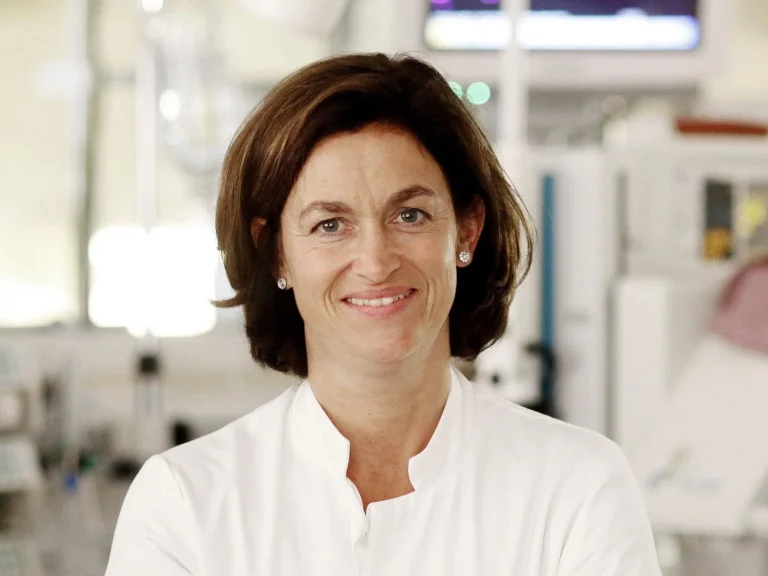25-27 September 2025

Registration and accommodation bookings are closed.

The European Academy of Paediatrics (EAP) invites you to an exceptional opportunity to accelerate your leadership journey. Join peers and mentors from across Europe for three dynamic days of interactive learning, skill-building, and professional networking in one of Germany’s most vibrant cities.
Designed for emerging paediatric leaders and young professionals in medical advocacy and public relations, the EAP Leadership Academy will help you develop essential leadership competencies and master the art of influencing change within the healthcare landscape.
Places are strictly limited to 30 participants to ensure an intensive and personalised experience.
The EAP Leadership Academy 2025 is proudly supported by:

Increasing the positive impact of nutrition.

Transforming the practice of medicine through breakthrough science.
Thursday throughout the day
Icebreaker and Iinitial Orientation at Restaurant Spagos, Radisson Blu Hotel
Address: Augustusplatz 5–6, 04109 Leipzig
Prof. Suzanne Suggs & Prof. Berthold Koletzko
09:30–09:50 | Regulatory science & paediatrics – by Sanja Kolacek
09:50-10:10 | Why leadership training and communication skills are essential for paediatricians – by Suzanne Suggs
10:10 – 10:25 | Media communication – by Daniel Saraga
10:25 – 10:40 | Advocacy introduction – by Peggy Diby
10:40 – 10:55 | Social media, public and patient-provider communication – by Austėja Stankutė-Kolosov & Suzanne Suggs
10:55 – 11:00 | Buffer time / transitions / Q&A
 11:30 – 13:00 | Parallel Workshops
11:30 – 13:00 | Parallel Workshops
– Daniel Saraga
Introduction:
Differences between
academic and media communication.
Exercise:
Prepare and refine 3 key
messages.
Practice:
Mock interviews.
Tips: Practical media handling advice
(e.g. interacting with journalists).
- Peggy Diby
Introduction:
Role of paediatricians in
policy dialogue.
Tools:
How to approach and influence
decision-makers.
Practice:
Building arguments,
developing partnerships, real-world
scenarios.
- Prof. Suzanne Suggs & Dr. Austeja Stankutė-Kolosova
Part 1:
Communicating with Parents,
Patiens and Public in clinical settings
(interpersonal communication).
Part 2:
Leveraging social media to
educate and advocate.
Role-play:
Real-life communication
dilemmas and scenarios
Dinner – Skyline Soirée IN LEIPZIG @ Cabana Rooftop Bar | INNSiDE by Meliá
🎥 Media: Mock interviews & media exercises
📱 Social Media & Patient Communication: Showcase of strategies, social media campaign pitch or parent interaction roleplay
🎯 Advocacy: Role-play panel discussions & Stakeholder pitch or elevator speech.
Paediatric advocacy: Experiences from
Germany (~15 min) by Ursula Felderhoff-Müser
Key elements & lessons learnt from corporate advocacy for effective communication (~20-30 min) by Peggy Diby
Panel insights by Ursula Felderhoff-Müser, Peggy Diby,
Sanja Kolacek, Berthold Koletzko
@ Radisson Blu Hotel Augustusplatz 5–6
The EAP Leadership Academy faculty includes paediatric experts, trailblazing advocates, and experienced leaders who have shaped the future of child health.
They’re here to challenge, guide, and inspire you to become the next voice of paediatrics in Europe.

Leadership Academy Programme Director
Full Professor of Social Marketing, USI, Switzerland Prof. Suggs leads the BeCHANGE research group at the Università della Svizzera italiana and is Vice-President of the Swiss School of Public Health. She has served as co-chair of the Swiss National COVID-19 Science Task Force and is an expert in health communication, vaccination acceptance, and behavioural health strategies. Prof. Suggs advises governments and institutions on science communication and health policy, and teaches internationally on health communication and social marketing.

Leadership Academy Programme Director

President, EAP & Chair, EAP Leadership Academy
Prof. Koletzko is the Else Kröner-Senior Professor of Paediatrics at LMU Munich and Head of the Division of Metabolic and Nutritional Medicine at Dr. von Hauner Children's Hospital. An internationally recognised expert in paediatric nutrition and metabolism, he has authored over 1,200 scientific articles and holds leadership roles in several global health organisations. He is also the founder and chair of the Child Health Foundation, dedicated to promoting evidence-based child health initiatives.

President, EAP & Chair, EAP Leadership Academy

Global Head of Corporate Affairs & Internal Engagement of Nutrition Strategic Division at Nestlé
Peggy leads global advocacy and stakeholder engagement for Nestlé’s Nutrition Division with a strong focus on equity, sustainability, and women’s health. With over 20 years of experience in the agrifood sector, she has championed corporate strategies that integrate corporate social responsibility into business operations. She has been a vocal advocate for delivering positive social impact across the value chain and is committed to creating safe, dignified, and empowering environments for women at every stage of life. Peggy is also an active mentor and speaker, advocating for reproductive justice and inclusive business leadership. Her leadership embodies the belief that corporate action is essential to achieving reproductive justice and building a future where no woman must choose between her health and her work.

Global Head of Corporate Affairs & Internal Engagement of Nutrition Strategic Division at Nestlé

Professor of Paediatrics, Medical University of Zagreb, Croatia Former Head, University Department of Paediatrics, Children’s Hospital
Prof. Sanja Kolaček is an internationally recognised expert in paediatric gastroenterology, based in Zagreb, Croatia. She is Professor of Paediatrics at the Medical University of Zagreb, where she also completed her Master of Science and PhD degrees. Until her retirement in 2022, she served as Head of the University Department of Paediatrics at the Children’s Hospital Zagreb and led the Croatian Referral Centre for Paediatric Gastroenterology and Nutrition. Prof. Kolaček was President of the European Society for Paediatric Gastroenterology, Hepatology and Nutrition (ESPGHAN) from 2019 to 2022 and now serves as the society’s Liaison Officer. She has contributed extensively to the advancement of her field through European research initiatives, expert advisory roles, and scientific collaborations. A prolific author and speaker, Prof. Kolaček has published over 300 papers in peer-reviewed journals and has delivered more than 250 invited lectures at major international scientific meetings. She has also served as Associate Editor for the Journal of Pediatric Gastroenterology and Nutrition and continues to contribute to several editorial boards and peer-review panels.

Professor of Paediatrics, Medical University of Zagreb, Croatia Former Head, University Department of Paediatrics, Children’s Hospital

President, German Society of Pediatrics and Adolescent Medicine, Generalsekretär der Deutschen Gesellschaft für KInder- und Jugendmedizin
Prof. Dr. med. Ursula Felderhoff-Müser is President of the German Society for Paediatrics and Adolescent Medicine (DGKJ). She is Director and Chair of Department of Pediatrics I at the University Hospital Essen (Universitätsklinikum Essen), University of Duisburg-Essen, with clinical and research focus in neonatology, developmental neurology, and neuroprotection. Her public DGKJ profile and institutional listings confirm her leadership roles and expertise.

President, German Society of Pediatrics and Adolescent Medicine, Generalsekretär der Deutschen Gesellschaft für KInder- und Jugendmedizin

Science and Policy Communication Specialist
Dr. Daniel Saraga is a seasoned science communicator and the founder of Saraga Communications, a Swiss agency specialising in science and policy communication. With a background in physics, he earned his PhD from University College London and has conducted research at the University of Basel. Dr. Saraga has held prominent roles in science communication, including serving as the Head of Science Communication at the Swiss National Science Foundation and as editor-in-chief of the Swiss research magazine Horizons. He has also been the managing editor of Technologist and Reflex magazines. In his current role, Dr. Saraga works with universities, governments, and companies across Europe, providing expertise in media training, strategic communication, and public engagement. He is trilingual, working in English, French, and German, and is dedicated to enhancing the impact of scientific research through effective communication strategies.

Science and Policy Communication Specialist

Paediatrician, Vaikų ir jaunimo klinika EMPATIJA
Austėja Stankutė-Kolosova is a paediatrician based in Vilnius, Lithuania. She completed her general paediatrics training at Vilnius University in 2022 and has since worked across several paediatric care settings, including emergency departments and primary care clinics. She currently practises part-time at Vaikų ir jaunimo klinika EMPATIJA, Šeškinės Poliklinika, Trakai Hospital, and Vilnius City Clinical Hospital. Austėja has been an active member of the Young EAP (European Academy of Paediatrics) team since May 2022, promoting international collaboration among early-career paediatricians. Her current professional interests include rare diseases, social paediatrics, and healthcare workplace management. She remains passionate about medical education and public engagement, regularly participating in academic events and initiatives to support young professionals in paediatrics.

Paediatrician, Vaikų ir jaunimo klinika EMPATIJA

New ways to test high-risk medical devices.
Manufacturers of medical devices need to test their products before being allowed to market them. Specifically, they require clinical data showing their medical device is safe and efficient. In this context, the EU-funded CORE-MD project will translate expert scientific and clinical evidence on study designs for evaluating high-risk medical devices into advice for EU regulators. The project will propose how new trial designs can contribute and suggest ways to aggregate real-world data from medical device registries.
It will also conduct multidisciplinary workshops to propose a hierarchy of levels of evidence from clinical investigations, as well as educational and training objectives for all stakeholders, to build expertise in regulatory science in Europe. CORE–MD will translate expert scientific and clinical evidence on study designs for evaluating high-risk medical devices into advice for EU regulators, to achieve an appropriate balance between innovation, safety, and effectiveness. A unique collaboration between medical associations, regulatory agencies, notified bodies, academic institutions, patients’ groups, and health technology assessment agencies, will systematically review methodologies for the clinical investigation of high-risk medical devices, recommend how new trial designs can contribute, and advise on methods for aggregating real-world data from medical device registries with experience from clinical practice The consortium is led by the European Society of Cardiology and the European Federation of National Associations of Orthopaedics and Traumatology, and involves all 33 specialist medical associations that are members of the Biomedical Alliance in Europe.